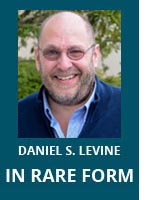
When my wife became pregnant with our first child, the technician performing the ultrasound asked if we wanted to know the sex of the child. My wife wanted it to be a surprise, but I did not.
Though the information did give me an upper hand in our pre-birth negotiations over potential names (knowing it was a boy allowed me to be a little more magnanimous about giving in on the girl’s name), it reflects a fundamental difference in our attitude about our own medical information.
Aside from the fact that I’m not a fan of surprises, it represented a fundamental belief I have that no medical personnel should have more information about me than I do. It also reflected a belief that information can have utility that I can’t recognize when its available. I tend to learn what I can learn and worry about the value of that information later.
When a colleague recently forwarded a study to me from earlier this year in the journal Genetics in Medicine about what information adolescents chose to learn about their own genetic information, it was interesting to see their reasoning. Though the study was based on a small sample size, it suggests adolescents are capable and thoughtful about making these decisions about their own genetic information and should have a role in doing so.
The findings support a recent statement on best practices from the American College of Medical Genetics and Genomics, a professional membership organization, that advocates that adolescents’ preferences ought to be independently considered when feasible before parents are asked to give permission about analysis and return of adolescents’ secondary clinical or research genomic results.
The researchers from the College of Medicine at the University of Cincinnati and Cincinnati Children’s Hospital Medical Center explored why adolescents choose to learn certain results and why they may or may not want to involve their parents in the decision-making process.
For the study, the researchers recruited 64 adolescents (age 13 to 17) without clinical indications. They were offered independent and then joint choices with a parent to learn genomic results. They could choose to learn about their results relating to conditions that were preventable and not preventable, treatable and not treatable, include or exclude information about adult-onset conditions, and include or exclude carrier results for autosomal recessive conditions.
The adolescents made choices independent of their parents and then met with their parents to discuss their initial choices and settled on a final decision. The researchers then interviewed participants about their decisions.
All but one of the adolescents elected to learn at least some results. Among the 31 adolescents who independently chose to omit some results, the conditions most often omitted were conditions that were not preventable (58 percent) and not treatable (71 percent). Less commonly excluded were adult-onset conditions (25 percent) and carrier status (29 percent).
After discussions with parents, adolescents changed their choices with the majority (78 percent) choosing to learn more information. Only 4 percent chose to learn less information.
The adolescents’ reasoning related to their ability to act on the information, their desire for knowledge about their own health, and their concerns about the potential psycho-social effects the information would have on them. Adolescents who changed their decisions after discussing them with their parents attributed the change to parental influence and improved understanding.
“It was common for adolescents from both groups to make discerning choices based on their perceived ability to incorporate risks,” write the researchers. “While they acknowledged that learning information may have negative consequences they felt risks were surmountable and learning information would decrease psychological impact.”
As for adolescents who chose to exclude results, they expressed concerns that they would feel anxiety from knowing the results and it would interfere with their social interactions. “Risks were perceived as insurmountable and superseded possible benefits,” the researchers wrote.
While the adolescents in the study arrived at different decisions, what the researchers showed was that adolescents wanted a say in these decisions and were capable of making thoughtful choices.
For the record, when the question arose during pregnancy about the sex of our second and third children, my wife decided she wanted to know as soon as that information was available. It’s unclear whether she lost her love of surprises or decided name negotiations work best when everyone involved operates from the same level of information.
November 20, 2018

Stay Connected
Sign up for updates straight to your inbox.
